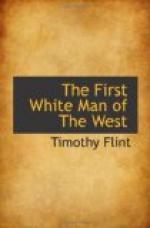Although the indulgence with which he was treated in the family, in which he was adopted, and these acquisitions, uniting interest with utility, tended to beguile the time of his captivity, it cannot be doubted, that his sleeping and waking thoughts were incessantly occupied with the chances of making his escape. An expedition was in contemplation, by the tribe, to the salt licks on the Scioto, to make salt. Boone dissembled indifference whether they took him with them, or left him behind, with so much success, that, to his extreme joy, they determined that he should accompany them. The expedition started on the first day of June, 1778, and was occupied ten days in making salt.
During this expedition, he was frequently sent out to hunt, to furnish provisions for the party; but always under such circumstances, that, much as he had hoped to escape on this expedition, no opportunity occurred, which he thought it prudent to embrace. He returned with the party to Chillicothe, having derived only one advantage from the journey, that of furnishing, by his making no attempt to escape, and by his apparently cheerful return, new motives to convince the Indians, that he was thoroughly domesticated among them, and had voluntarily renounced his own race; a persuasion, which, by taking as much apparent interest as any of them, in all their diurnal movements and plans, he constantly labored to establish.
Soon after his return he attended a warrior-council, at which, in virtue of being a member of one of the principal families, he had a right of usage and prescription, to be present. It was composed of a hundred and fifty of their bravest men, all painted and armed for an expedition, which he found was intended against Boonesborough. It instantly occurred to him, as a most fortunate circumstance, that he had not escaped on the expedition to Scioto. Higher and more imperious motives, than merely personal considerations, now determined him at every risk to make the effort to escape, and prepare, if he might reach it, the station for a vigorous defence, by forewarning it of what was in preparation among the Indians.
The religious ceremonies of the council and preparation for the expedition were as follow. One of the principal war chiefs announced the intention of a party to commence an expedition against Boonesborough. This he did by beating their drum, and marching with their war standard three times round the council-house. On this the council dissolved, and a sufficient number of warriors supplied themselves with arms, and a quantity of parched corn flour, as a supply of food for the expedition. All who had volunteered to join in it, then adjourned to their “winter house,” and drank the war-drink, a decoction of bitter herbs and roots, for three days—preserving in other respects an almost unbroken fast. This is considered to be an act tending to propitiate the Great Spirit to prosper their expedition. During this period of purifying themselves, they were not allowed to sit down, or even lean upon a tree, however fatigued, until after sun-set. If a bear or deer even passed in sight, custom forbade them from killing it for refreshment. The more rigidly punctual they are in the observance of these rights, the more confidently they expect success.




